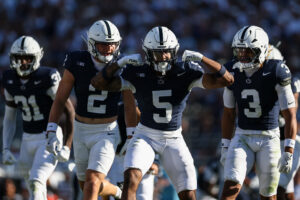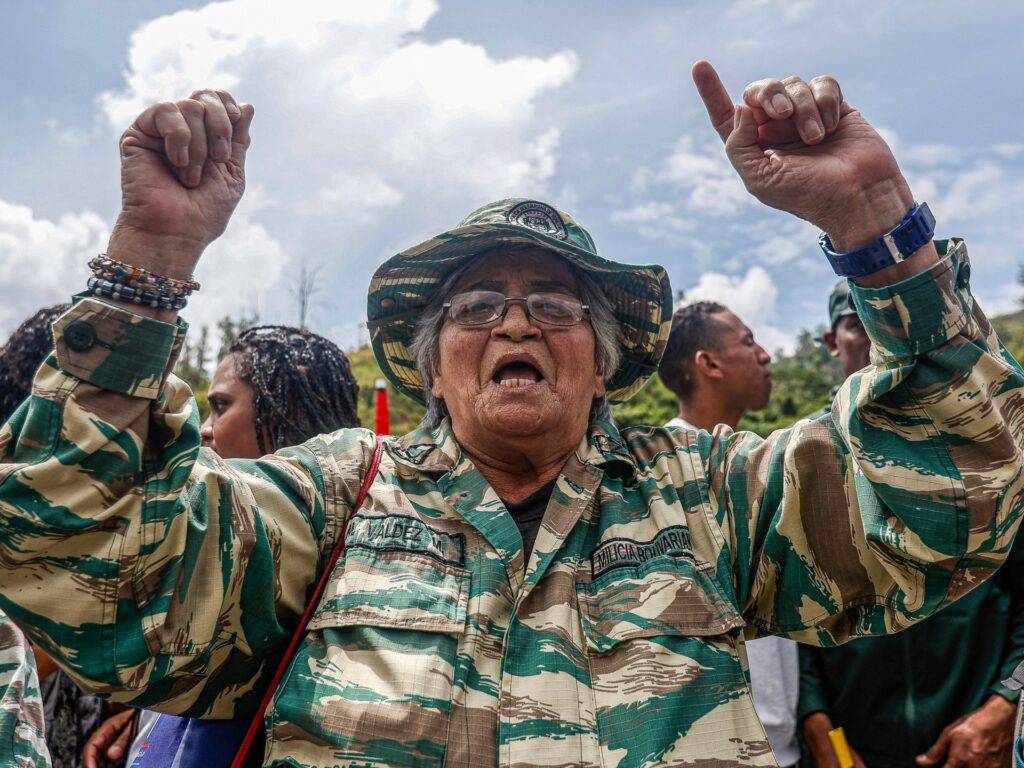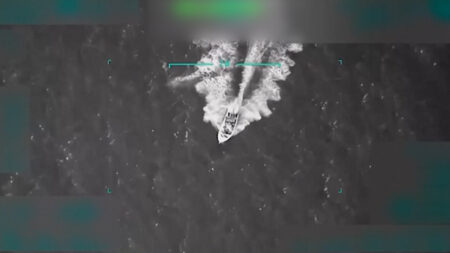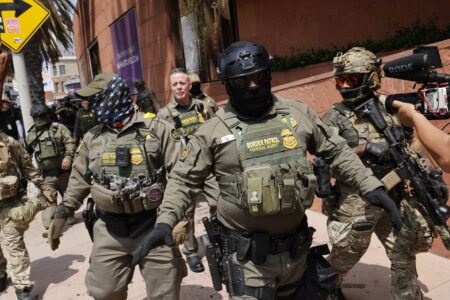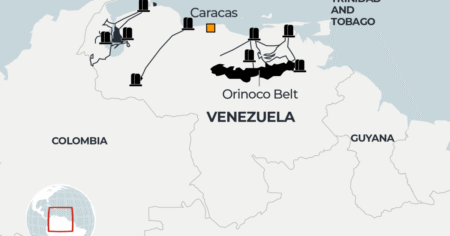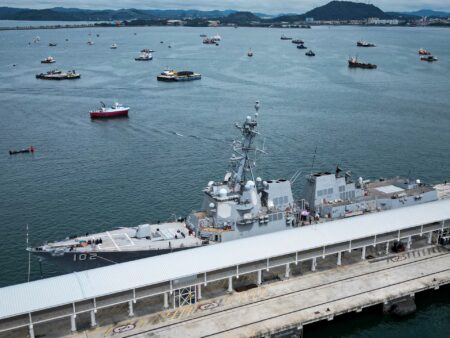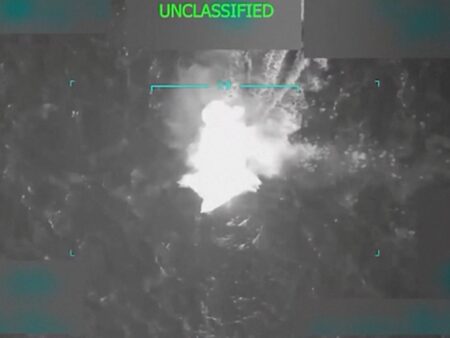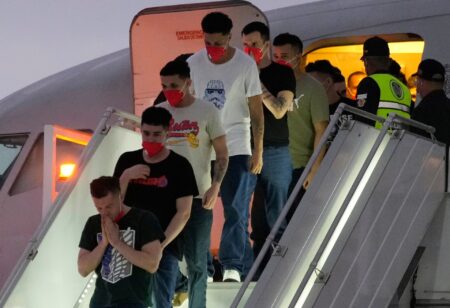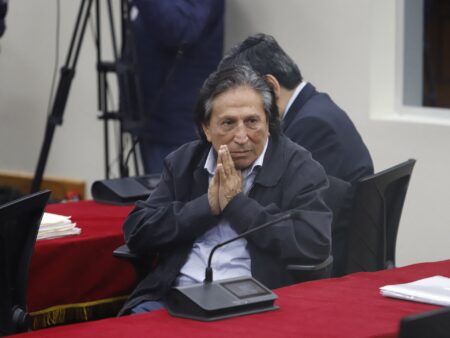The United States this week struck a boat in the Caribbean that President Donald Trump claimed belonged to Tren de Aragua, a notorious organised crime gang. Washington alleged the boat was smuggling drugs to the US.
The Trump administration has long claimed that cocaine shipments from Venezuela are prompting a drug overdose problem that plagues the US.
Recommended Stories
list of 4 itemsend of list
Here is what is happening between the US and Venezuela, and what facts on the ground tell us:
What action is the US taking against Venezuelan drug cartels?
The US attack on the Venezuelan boat on Tuesday came just a few days after news reports circulated about US warships advancing into Venezuelan waters.
Last month, The New York Times reported that Trump had signed a secret directive instructing the Pentagon to use military force against certain Latin American drug cartels designated by the US as foreign terrorist organisations.
Earlier in August, multiple news agencies reported that three US Aegis-class guided missile destroyer ships had headed to the Caribbean alongside other warships to counter narcotics trafficking.
The Reuters news agency, quoting two anonymous individuals who had been briefed on the deployment, reported that USS San Antonio, USS Iwo Jima, and USS Fort Lauderdale were headed towards the Venezuelan coast, carrying 4,500 US service members, including 2,200 Marines.
The US Fleet Forces Command published a news release on August 14, saying sailors and Marines assigned to the Iwo Jima Amphibious Ready Group had departed from Norfolk, Virginia and Camp Lejeune, North Carolina. The release did not explicitly state details of the mission or specify where the group is being deployed.
What happened in the US attack, and was it legal?
In his Truth Social post on Tuesday, Trump said 11 people, whom he deemed “terrorists”, had been killed in the strike. “Please let this serve as notice to anybody even thinking about bringing drugs into the United States of America,” Trump wrote.
The US did not provide further details on those killed.
Experts have cast doubt on the legality of the US attack on a foreign boat in international waters.
Salvador Santino Regilme, an associate professor at Leiden University in the Netherlands, told Al Jazeera that lethal force in maritime interdiction must comply with the right to life and to law enforcement necessity-and-proportionality standards.
“UNCLOS and the 1988 UN Drug Trafficking Convention emphasise cooperation, boarding and consent mechanisms at sea, not summary destruction. Any strike that kills suspected traffickers should trigger a prompt, independent, and transparent investigation,” Regilme said, referring to the United Nations Convention on the Law of the Sea.
The strike probably also flouted the US Constitution, constitutional law expert Bruce Fein told Al Jazeera.
“Any use of the military [except] in self-defence to an actual attack requires express congressional statutory authorisation. The military attack on the alleged Venezuelan drug traffickers was unconstitutional,” Fein said.
The War Powers Resolution is a federal law that stipulates the US president may not engage in war without the approval of Congress. Under the law, the president must inform Congress within 48 hours of taking military action.
However, US Secretary of State Marco Rubio told the press after a meeting with Mexican President Claudia Sheinbaum on Wednesday that strikes on drug-carrying boats like the one on Tuesday would continue. He added that the US has tried to intercept such boats, but that approach has not deterred them. “What will stop them is when you blow them up,” Rubio said.
— Marco Rubio (@marcorubio) September 4, 2025
How has Venezuela responded?
In response to the US deployment of warships, President Nicolas Maduro urged his supporters to join militias to protect the country, saying, “No empire will touch the sacred soil of Venezuela.”
One such armed group is the Bolivarian Militia, which is named after Simon Bolivar, who was a Caracas-born independence leader who liberated the modern-day Venezuela, Colombia, Ecuador, Peru, Panama, and Bolivia from the Spanish Empire.
On Thursday, the Pentagon released a statement claiming that two Venezuelan military planes had flown near US ships in international waters, describing the act as a provocation and warning against a repeat.
What does the US accuse Venezuela of?
The Trump administration claims Venezuela’s left-wing president is directly working with drug cartels and is involved in cocaine trafficking. It has accused Tren de Aragua of serving as a “front” for the Maduro government. Trump designated Tren de Aragua as a “foreign terrorist organisation” on his first day in the Oval Office on January 20.
In 2020, during Trump’s first term, Maduro was indicted by a US federal court on drug charges, including narcoterrorism and conspiracy to import cocaine.
On August 7, the US Department of Justice and the State Department doubled a reward for information leading to Maduro’s arrest to $50m, accusing him of being “one of the largest narco-traffickers in the world”.
“Officially, Washington frames the action as a counter-narcotics strike against Tren de Aragua and other ‘narco-terrorist’ networks,” Regilme said.
“The move also extends a years-long coercive strategy towards the Maduro government that dates to US narcoterrorism charges in 2020, and it serves a domestic messaging goal – linking a hard-edged foreign policy to drug control at home.”
Maduro returned to power after last year’s disputed election, which resulted in widespread accusations of fraud from within and outside Venezuela. In July 2024, independent observer, the Carter Center released a statement saying it could not verify the election results declared by Venezuela’s National Electoral Council (CNE). The statement added the election “did not meet international standards of electoral integrity and cannot be considered democratic”. A panel of United Nations experts also echoed this. Nine Latin American countries demanded a review of the election results in the presence of independent observers.
The US has not had a formal diplomatic relationship with Venezuela since 2019 and does not recognise Maduro’s presidency as legitimate.
The US has accused Maduro and his minister of interior, justice and peace, Diosdado Cabello, of collaborating with the Cartel de los Soles (Cartel of the Suns), which Washington has also designated as a “terrorist” group. Like Maduro, Cabello is a member of the ruling United Socialist Party of Venezuela (PSUV).
In March, Trump invoked the 1798 wartime Alien Enemies Act, allowing him to detain and deport people from a “hostile nation or government”. On the same day, the Trump administration deported more than 230 Venezuelan men to a maximum-security El Salvador prison, the Center for Terrorism Confinement (CECOT).
On Tuesday, a US federal appeals court ruled that Trump could not use the 1798 Act to deport suspected gang members.
Are the Trump administration’s allegations against Venezuela true?
The Trump administration has not provided any evidence linking Maduro to Tren de Aragua or any other drug cartel, and the Venezuelan leader has denied the allegations.
The US intelligence community has also contradicted the Trump administration’s claims that there are links between the Venezuelan government and Tren de Aragua.
A classified assessment by the National Intelligence Council released in April repeatedly stated that there was no evidence of coordination between Tren de Aragua and any senior leaders in the Maduro administration, although it did state that the permissive environment in Venezuela allowed drug gangs to flourish.
The report drew input from all 18 agencies that comprise the US intelligence community. All agencies, except the Federal Bureau of Investigation (FBI), agreed with the findings.
How much cocaine comes from Venezuela?
According to the World Drug Report, published by the UN Office on Drugs and Crime (UNODC) this year, the global production of cocaine reached a record high in 2023, exceeding an estimated 3,708 tonnes – an increase of nearly one-third compared with the previous year.
The UNODC report shows that a majority of the coca bush, from which cocaine is derived, was cultivated in Colombia, followed by Peru and Bolivia. The report also shows that most of the main routes of cocaine trafficking in 2023 and 2024 into the US passed through Colombia, Peru and Ecuador, rather than Venezuela.
Venezuela is used as a “transit corridor” for some Colombian cocaine moving into the eastern Caribbean, Regilme said. “But the dominant maritime pathway for US-bound cocaine remains the Eastern Pacific into Mexico and Central America, where the largest interdictions occur. Recent seizures underscore that pattern.”
The US Drug Enforcement Administration (DEA) released an annual cocaine report in 2024, which identified Colombia as the primary source of cocaine seized by the US. About 84 percent of the cocaine seized in the US was found to be originating from Colombian coca. The report does not mention Venezuela.
Read the full article here


